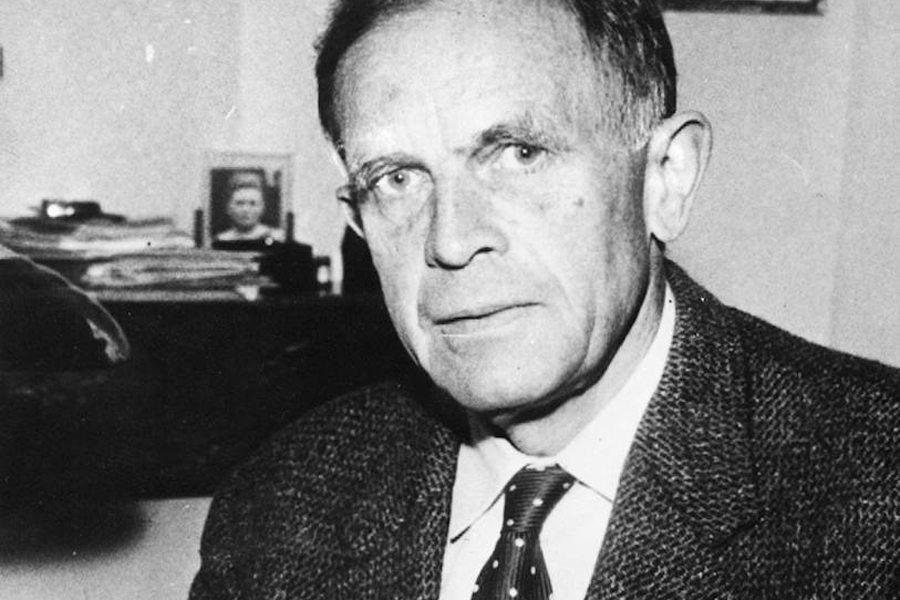Reading The Law of Blood can help us understand the beliefs that animated National Socialism, and help us see what they were not.
Dear Anti-Market Conservatives: Meet Wilhelm Röpke
Though conservatives are often portrayed as strong supporters of the free market, not all of them are. Now and in the past, many individuals have happily embraced the conservative label while expressing strong reservations about, if not outright rejection of, market economies.
Even so I’ve noticed, as someone who identifies very much as a conservative, that skepticism of markets among conservatives has swelled in recent years. The financial crisis of late 2007 to 2009 and the subsequent recession have hardened an attitude—including among conservatives—that free markets are essentially unfair, facilitate unhealthy cultural trends, and leave many people on life’s economic margins.
It would be unwise to dismiss the conservative critique of capitalism as resulting solely from either insufficient knowledge of economics and economic history, or from the embrace of romantic visions of pre-industrial life. Certainly, these and other elements play a role. So too, I suspect, does personal experience of the turmoil associated with recent economic upheavals, invariably blamed as they are on allegedly unfettered markets.
But surely another cause of this rising anti-market sentiment is many free marketers’ inadequate responses to these and other concerns. Rejoinders like, “If you only understood economics, you’d just know that everyone’s better off in the long-term” may be true—if one is primarily thinking in aggregate terms about material prosperity, lifespans, and overall levels of human health. It is a reckless soul who would trivialize such things. Such reasoning, however, fails to answer legitimate questions that many conservatives have long pondered, such as where markets fit into accounts of the good life that go beyond an emphasis on individual autonomy.
One thinker who seriously engaged these issues in satisfyingly broad and deep terms is the economist who was perhaps most responsible for laying the intellectual foundations of Germany’s market-driven economic miracle in the postwar period. Wilhelm Röpke died just over half a century ago. Yet his numerous writings not only underscore his appreciation of the market economy’s unique ability to solve many economic problems and contribute to the development of free and civilized societies; they also reveal him as an economist who reflected widely, to cite his most famous book’s German title, beyond the world of supply and demand.
Born in 1899 in Schwarmstedt in lower Saxony, Röpke was decisively marked, like many of his generation, by the experience of combat in World War I. A decorated war hero, he graduated from the University of Marburg with a doctorate in economics in 1921. At the age of 24, he became Germany’s youngest professor. Deeply read in fields outside of economics and the master of several European classical and modern languages, Röpke was an intellectual star in a country that took academics very seriously.
Röpke’s free market views manifested themselves early on. He fiercely opposed the cartels and monopolies that littered the economies of Imperial and Weimar Germany. For this reason, Röpke wasn’t shy about criticizing large German businesses’ cozy relationships with political parties. He was also hostile to price controls, censorious of the welfare state established by Otto von Bismarck and expanded by successive German governments, an outspoken free trader in a protectionist age, and a lifelong promoter of the gold standard at a time when many governments tried to disguise deeper economic problems by printing money.
Until the mid-1930s, Röpke’s politics were more of the classical liberal variety than conservative. Though a patriotic German, Röpke was critical of the hyper-nationalist strain of early 20th century German conservatism, much of which articulated decidedly protectionist views. It was, however, his outspoken criticism of the National Socialists (matched by his equally stern denunciations of communism) that led to Röpke’s being one of the first professors to be dismissed from German universities after the Nazis came to power in 1933.
As a bona fide war hero and accomplished athlete who closely approximated the Nazis’ “Aryan” ideal-type, Röpke was exactly the sort of intellectual who could have prospered, if he had so desired, in National Socialist Germany. But rather than bend to the regime’s expectations, Röpke went into exile. He taught economics at the University of Istanbul before becoming a professor at Geneva’s Graduate Institute of International Studies in 1937.
It was Röpke’s time in Turkey that caused him to start asking questions about the preconditions for not just free markets but civilizations that took freedom and the good life seriously. Later on, he would look back and say that his experience of living in a Muslim country (albeit one that was being aggressively secularized at the time) made him realize the huge differences between Western societies “and everyone else.” The most significant dissimilarities, Röpke observed, were to be seen in institutions, value commitments, and, above all, religion.
As he grew older, Röpke’s Christianity became more important to him, personally and intellectually. Describing himself as a believing Protestant Christian who wished the Reformation had never happened, Röpke became more and more critical of the hostility toward Christianity that pervaded the liberal academic circles in which he travelled. Like Alexis de Tocqueville, Röpke increasingly argued that it had been Christianity, rather than liberalism, that had made the most decisive contributions to freedom’s emergence in the West. Nor did Röpke hesitate to highlight the utilitarianism, positivism, and scientism that lay just beneath the surface of a good deal of 19th century liberal thought.
Moreover, like Adam Smith, Röpke wasn’t afraid to concede that free markets can have negative effects. Some of his writings were concerned with finding ways to ameliorate, for example, the deleterious social impact often associated with the heavy specialization that’s integral to the division of labor encouraged by growing markets.
Nor was Röpke opposed in principle to state intervention. There were, he believed (like Smith), occasions when governments had to act to stave off wider crises that might threaten basic confidence in free markets.
Röpke also, however, believed that any such interventions should be guided by constitutional and legal principles that 1) prevented such temporary measures from morphing into more permanent features of the economic landscape, and 2) promoted crucial elements of the market such as free prices, private property, stable money, and free competition. These ideas lay at the heart of Ludwig Erhard’s 1948 liberalization of the West German economy, which turned a devastated country into Europe’s economic superpower within 10 years. During World War II, Erhard had clandestinely read as many of Röpke’s writings as he could. He later described them, and Röpke’s moral example, as constant reference points during his years as West Germany’s economics minister.
For all his criticisms of some aspects of free market thought, Röpke never wavered in his conviction that the trade-offs entailed by embracing commercial society were worth it. For one thing, he believed that the market economy reflected certain truths about the human condition. Denying these truths, he thought, was like denying that humans are fallible.
But what makes Röpke’s case for the market economy distinct in his later years is just how much it reflects a conservative’s case for economic freedom rather than a more recognizably classical liberal or a libertarian argument. One can see this change in Röpke’s thought happening in his three-volume trilogy written in Switzerland during World War II. The most mature expression of Röpke’s reflections on these matters was his famous A Humane Economy: The Social Framework of the Free Market, translated into English in 1960.
Described by the distinguished economist of competition and entrepreneurship (and noted Talmudic scholar) Israel Kirzner as “a classic,” A Humane Economy outlined all the reasons why socialism can’t help but result in severe economic dysfunction. The book also expressed a powerful critique of the-then regnant Keynesianism, showing the ill-effects of trying to promote full employment and security for all through deficit-spending, loose monetary policy, and social welfare programs. These “facts,” as Röpke called them, “demand a firm position against” socialism and mixed economies on the part of anyone attentive to evidence. The same facts, he held, should incline us to the market order, insofar as economic policy was concerned.
That last qualification matters because it reflects Röpke’s conviction that markets needed to be grounded in cultures richly populated with intact families and intermediate associations, political systems that emphasized federalism, and philosophically undergirded by commitments to moral absolutes and natural law thought. Röpke also argued that the cultures in which markets are embedded must reject what he called “isms,” such as “utilitarianism, progressivism, secularism, [and] rationalism.” Röpke also sharply condemned “what Eric Vogelin aptly calls ‘immanentism’ ”—that is, believing that humans can somehow produce heaven on earth.
If this all sounds conservative, that’s because it is. Röpke even described these ideas as the “conservative ingredients” of his political economy. They are also reminiscent of the type of economics associated with Edmund Burke.
This shouldn’t surprise us. Burke was, after all, an admirer of Smith’s Wealth of Nations (1776), a champion of free trade, a convinced Christian, and the founder of modern conservativism by virtue of his opposition to the various “isms” let loose by the French Revolution. To this extent, Burke foreshadows Röpke’s argument that economic freedom is indispensable (albeit insufficient) for preserving what Röpke called “Western civilization” against the overly centralized governments and bureaucracies that corrode freedom and harm the communities that nourish liberty-sustaining virtues.
These are all classic Burkean insights to which conservatives interested in traditionalist (or even crypto-socialist) economic alternatives to the market should be attentive. Like many conservatives, Röpke was sensitive to many of the problems associated with modernity. This, however, didn’t stop him from stressing how market economies—as opposed to crony capitalism, social democracy, or the variants of populism that have inflicted economic misery upon many Latin American countries—can help promote distinctly non-economic goals that conservatism has always considered important.
Certainly Röpke wasn’t right about everything. He bought into, for example, much of the population-growth hysteria that preoccupied many Western European intellectuals (and still does). In devising his framework to limit and guide state economic intervention, Röpke struggled at points to devise clear lines of demarcation.
Yet he got some very important things right. Prominent among these was his prediction that the then-European Economic Community (today’s EU) would turn into a top-down bureaucratic behemoth that would threaten many of the liberties and values held dear by conservatives as well as many classical liberals. Likewise, his warnings that the welfare state would significantly damage what we today call civil society—something especially valued by conservatives—turned out to be dead on target.
All this is to urge those conservatives attracted to schools of economic thought ranging from distributism to corporatism, or even tempted by Marxist economic analysis, to read some of Röpke’s works before they reject the market economy holus bolus. In texts such as A Humane Economy and Economics of the Free Society (1963), they will find many of their concerns discussed sympathetically and addressed dispassionately. But they’ll also encounter strong normative arguments about why a commitment to market economies can and should form part of the conservative agenda in an age in which, like Röpke’s, the economics of the Left are in the ascendant.


